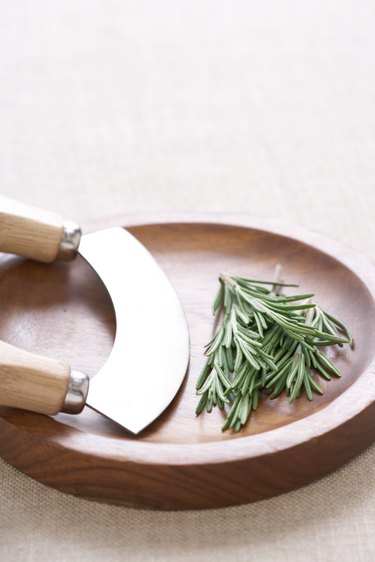
Whether your herb garden consists of a few potted plants or a garden plot, rosemary (Rosmarinus officinalis) deserves a prime place. This herb delights gardeners and cooks with its silvery green foliage, blue flowers and delicious flavor. Regular garden soils usually keep rosemary well fed, but occasionally it can use a nutritional boost. A few simple, homemade remedies can help provide rosemary with the extra nutrients it may need.
Mediterranean Roots
Video of the Day
Rosemary's Mediterranean heritage provides the clues to this herb's basic needs Rosmarinus officinalis, winter-hardy in U.S. Department of Agriculture plant hardiness zone 8 through 10, thrives in well-drained, full-sun locations with good air circulation. Some cultivars can tolerate winters in USDA zone 7. Lean, poor soils bring out the best in rosemary's intensely aromatic leaves. Slightly acidic to neutral soil with a pH level of 6.0 to 7.0 is ideal. Slight acidity frees up soil nutrients so your rosemary can take up everything it needs.
Video of the Day
Boosting Nutrients
Rosemary rarely needs fertilizer unless your soil has been depleted or the pH is too high. the best time to apply extra fertilizer is in spring before the herb puts on new growth. High-nitrogen fertilizers can make rosemary susceptible to insect problems. Too much fertilizer of any kind can lower the aromatic oils in rosemary's needle-like leaves. If your plant looks undernourished, make sure the soil is draining well. Rosemary likes to dry out slightly. Too much water will stress this herb.
Java to the Rescue
The best homemade solutions for rosemary fertilizer provide balanced nutrition and lower soil pH slightly. This adds nutrition while helping rosemary use micronutrients in soil. If you're a coffee drinker, you already have a perfect solution close at hand. Diluted coffee provides a gentle, balanced drink of nitrogen, magnesium and potassium in a slightly acidic base. Use one part regular-strength, brewed coffee to four parts water. Brewed coffee is highly acidic, so always dilute it before watering your rosemary with it. Coffee grounds can be used for the same effect. Grounds are less acidic than brewed coffee, but still keep them to a minimum, and dry the wet grounds on newspaper first. A handful of dried grounds worked into the soil around the base of your rosemary can help raise the acidity of the soil and deliver nutrients such as nitrogen.
Tapping Water
A final simple step to boosting your rosemary's nutrition involves the water you use on your plant. Tap water is often alkaline. Regular watering from the tap can slightly elevate soil pH. For a quick remedy, add 1 tablespoon of apple cider vinegar to 1 gallon of water when you water your herb. This counteracts the alkalinity and provides a number of trace minerals your rosemary can use. Always check your soil before watering to make sure it's slightly dry, and then water thoroughly. Plant rosemary close to walkways and your kitchen door. Enjoy the aromatic oils and the flavor of your healthy rosemary herb.
- Texas A&M AgriLife Extension: Easy Gardening - Rosemary
- Master Gardeners of Hamilton County, TN: Homemade Fertilizers
- North Carolina State University Cooperative Extension Service: Growing Herbs for the Home Gardener
- University of Illinois Extension: Coffee as Fertilizer?
- Missouri Botanical Garden: Rosmarinus
- Mountain Valley Growers: Rosemary